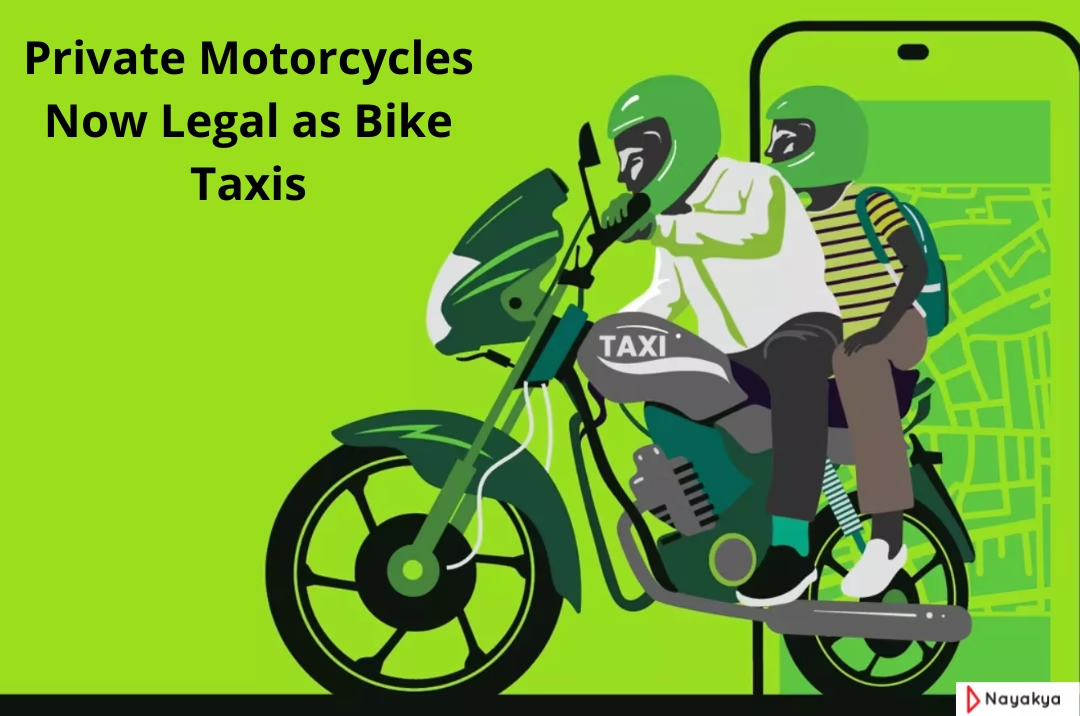Private Motorcycles Now Legal as Bike Taxis – Urban Commute Reimagined 2025
In a transformative move for urban transportation in India, private motorcycles now legal as bike taxis. This groundbreaking regulation opens up a wave of opportunities for commuters, gig workers, and mobility platforms, reshaping how Indian cities tackle congestion, employment, and last-mile connectivity.
This article explores everything you need to know about the legalization of private bikes as bike taxis, the benefits, challenges, government guidelines, and what it means for the future of Indian transport.
What’s New in the Guidelines for Private Motorcycles Now Legal as Bike Taxis?
Under Clause 23.3 of the updated Motor Vehicle Aggregator policy, the central government has invoked sub-section (3) of Section 67 of the Motor Vehicles Act, giving state governments the power to authorize private motorcycles to ply as bike taxis.
This means that:
- States may allow private bike owners to list their bikes for rides on aggregator platforms.
- It is not mandatory—each state can choose whether to implement it or not.
- Motorcycles can operate on daily, weekly, or fortnightly basis based on the state’s framework.
What Does Legalizing Private Motorcycles as Bike Taxis Mean?
In simple terms, the Indian government now permits private two-wheelers—previously restricted to personal use only—to operate as bike taxis on commercial ride-hailing platforms like Rapido, Ola, and Uber.
Earlier, only commercially registered (yellow-board) motorcycles were allowed to offer taxi services. However, strict registration and licensing norms made scaling these services difficult. With the new regulation, any privately registered two-wheeler can now serve as a bike taxi, provided they adhere to local transport and safety norms.
This decision was influenced by:
-
Increased demand for affordable ride options.
-
Rising unemployment and demand for gig opportunities.
-
The success of pilot programs in cities like Bangalore, Gurgaon, and Hyderabad.
Why Is This a Big Deal for Urban Mobility?
This policy shift marks a paradigm change in last-mile connectivity and urban transportation. Here’s why:
1. Lower Cost Commutes
Bike taxis are typically 30–50% cheaper than auto-rickshaws or cabs, making them the most affordable option for short-distance travel in cities.
2. Reduced Traffic Congestion
Two-wheelers navigate congested streets more efficiently, reducing both traffic density and commuting time during peak hours.
3. New Employment Opportunities
Gig workers can now use their personal bikes to earn income via ride-sharing platforms, enhancing livelihood options for millions across India.
4. Increased Platform Supply
Platforms like Rapido and Uber Moto will benefit from a larger pool of active riders, improving service availability and reducing ETAs.
5. Boost to Rural and Tier-II/Tier-III Cities
The move will also accelerate mobility penetration in semi-urban and rural areas, where two-wheelers are more prevalent than four-wheelers.
State-by-State Adoption: Where Private Motorcycles Now Legal as Bike Taxis in 2025?
As of July 2025, the following states have officially allowed private motorcycles as bike taxis:
-
Maharashtra – Mumbai, Pune, and Nagpur have seen rapid platform adoption.
-
Karnataka – Bengaluru is a leader in two-wheeler taxi adoption.
-
Uttar Pradesh – Lucknow and Noida see rising usage.
-
Telangana – Hyderabad’s government has issued operational permits.
-
Delhi NCR – Recent policy greenlight given for private bike taxi pilots.
Note: Some states, such as Tamil Nadu and West Bengal, are still debating regulations due to concerns over safety, insurance, and licensing. Always verify local rules before operating.
Benefits of Allowing Private Bikes as Taxis
| Benefit | Description |
|---|---|
| Affordability | Riders can save up to 50% on short-distance rides. |
| Job Creation | Over 1 million gig jobs expected to be created in 2025. |
| Faster Commutes | Bikes cut travel time during traffic jams. |
| Reduced Emissions | Encourages two-wheeler EV adoption for ride-sharing. |
| Low Capital Entry | Riders don’t need to purchase commercial bikes. |
Concerns and Criticisms Around This Policy
While the benefits are clear for Private Motorcycles Now Legal as Bike Taxis, some concerns persist:
Insurance and Liability:
Most private motorcycles carry personal insurance, which may not cover commercial use. Regulatory clarity on insurance upgrades is needed.
Rider and Passenger Safety:
Mandatory helmet laws, licensing verification, and safety training must be enforced to prevent misuse or accidents.
Surge in Unregulated Rides:
With no commercial license required, some fear untrained or underage riders may exploit loopholes.
Revenue Impact on Traditional Taxi Services:
Auto-rickshaw unions in some states have protested, citing unfair competition from cheaper bike taxis.
How to Legally Register as a Bike Taxi Rider with a Private Motorcycle
Thinking of becoming a bike taxi rider? Follow these steps:
-
Register on a Platform – Join Ola, Uber, or Rapido.
-
Upload Documents – Provide license, RC, insurance, and ID proof.
-
Training/Onboarding – Complete any required safety training.
-
App Activation – Once verified, your bike becomes live for bookings.
-
Maintain Compliance – Wear a helmet, follow traffic rules, and provide passenger helmets.
The Future of Bike Taxis in India – What Lies Ahead
India’s two-wheeler market is the largest in the world, with over 200 million registered bikes. Legalizing private motorcycles as taxis taps into this vast network, making mobility more inclusive, efficient, and scalable.
Key trends to watch:
-
Electric Two-Wheelers: EV startups are aligning with bike taxi platforms for green commuting.
-
AI-Based Safety Monitoring: Real-time ride tracking, facial recognition, and ride feedback tools are being deployed.
-
Unified Licensing: Centralized digital licenses and insurance policies may be introduced soon.
-
Women-Only Bike Taxi Services: New startups are offering women-to-women taxi options for safer travel.
Final Thoughts – Is This Policy a Step Forward or a Risk?
The decision to legalize private motorcycles as bike taxis in 2025 is a bold and much-needed reform. It addresses India’s urban transport woes, empowers gig workers, and makes last-mile travel more efficient. However, its success will depend on how well state governments, platforms, and users collaborate to ensure safety, insurance compliance, and long-term viability.
